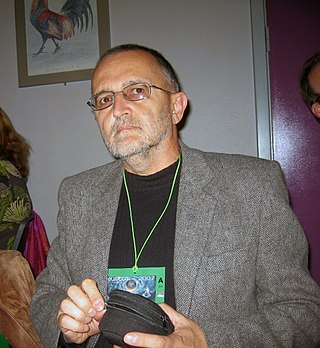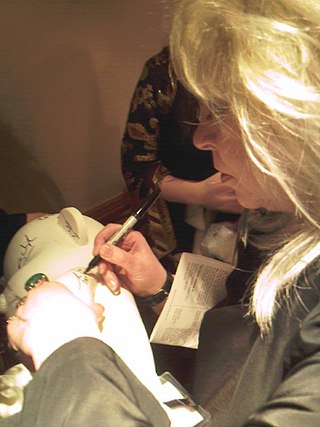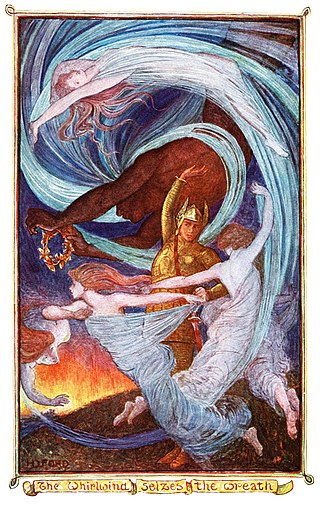Feminist science fiction is a subgenre of science fiction focused on such feminist themes as: gender inequality, sexuality, race, economics, reproduction, and environment. Feminist SF is political because of its tendency to critique the dominant culture. Some of the most notable feminist science fiction works have illustrated these themes using utopias to explore a society in which gender differences or gender power imbalances do not exist, or dystopias to explore worlds in which gender inequalities are intensified, thus asserting a need for feminist work to continue.
Science fiction and fantasy serve as important vehicles for feminist thought, particularly as bridges between theory and practice. No other genres so actively invite representations of the ultimate goals of feminism: worlds free of sexism, worlds in which women's contributions are recognized and valued, worlds that explore the diversity of women's desire and sexuality, and worlds that move beyond gender.
The New Wave was a science fiction style of the 1960s and 1970s, characterized by a great degree of experimentation with the form and content of stories, greater imitation of the styles of non-science fiction literature, and an emphasis on the psychological and social sciences as opposed to the physical sciences. New Wave authors often considered themselves as part of the modernist tradition of fiction, and the New Wave was conceived as a deliberate change from the traditions of the science fiction characteristic of pulp magazines, which many of the writers involved considered irrelevant or unambitious.

Ursula Kroeber Le Guin was an American author. She is best known for her works of speculative fiction, including science fiction works set in her Hainish universe, and the Earthsea fantasy series. Her work was first published in 1959, and her literary career spanned nearly sixty years, producing more than twenty novels and over a hundred short stories, in addition to poetry, literary criticism, translations, and children's books. Frequently described as an author of science fiction, Le Guin has also been called a "major voice in American Letters". Le Guin said she would prefer to be known as an "American novelist".
Canadian literature is written in several languages including English, French, and to some degree various Indigenous languages. It is often divided into French- and English-language literatures, which are rooted in the literary traditions of France and Britain, respectively. The earliest Canadian narratives were of travel and exploration.
Genre fiction, also known as formula fiction or popular fiction, is a term used in the book-trade for fictional works written with the intent of fitting into a specific literary genre in order to appeal to readers and fans already familiar with that genre.

Zoran Živković is a Serbian writer, university professor, essayist, encyclopedist, publisher and translator. Živković's works have been translated into 20 languages and he was awarded the 2003 World Fantasy Award.

LGBT themes in speculative fiction include lesbian, gay, bisexual, or transgender (LGBTQ) themes in science fiction, fantasy, horror fiction and related genres.[a] Such elements may include an LGBT character as the protagonist or a major character, or explorations of sexuality or gender that deviate from the heteronormative.

Tanith Lee was a British science fiction and fantasy writer. She wrote more than 90 novels and 300 short stories, and was the winner of multiple World Fantasy Society Derleth Awards, the World Fantasy Lifetime Achievement Award and the Bram Stoker Award for Lifetime Achievement in Horror. She also wrote a children's picture book, and many poems. She wrote two episodes of the BBC science fiction series Blake's 7 .
Slipstream is a literary genre or category of speculative fiction that blends together science fiction, fantasy, and literary fiction or does not remain in conventional boundaries of genre and narrative. It directly extends from the experimentation of the New Wave science fiction movement while also borrowing from fantasy, psychological fiction, philosophical fiction and other genres or styles of literature.

Elements of the supernatural and the fantastic were an element of literature from its beginning. The modern fantasy genre is distinguished from tales and folklore which contain fantastic elements, first by the acknowledged fictitious nature of the work, and second by the naming of an author. Authors like George MacDonald (1824–1905) created the first explicitly fantastic works.

Science fiction is an important genre of modern Japanese literature that has strongly influenced aspects of contemporary Japanese pop culture, including anime, manga, video games, tokusatsu, and cinema.

Science fiction and fantasy in Poland dates to the late 18th century. However, science fiction as a genre in Polish literature truly began to emerge at the end of the 19th century under the influence of Jules Verne's work. During the latter years of the People's Republic of Poland, a very popular genre of science fiction was social science fiction. Later, many other genres gained prominence.
With the growth of science fiction studies as an academic discipline as well as a popular media genre, a number of libraries, museums, archives, and special collections have been established to collect and organize works of scholarly and historical value in the field.
Science fiction studies is the common name for the academic discipline that studies and researches the history, culture, and works of science fiction and, more broadly, speculative fiction.

Black science fiction or black speculative fiction is an umbrella term that covers a variety of activities within the science fiction, fantasy, and horror genres where people of the African descent take part or are depicted. Some of its defining characteristics include a critique of the social structures leading to black oppression paired with an investment in social change. Black science fiction is "fed by technology but not led by it." This means that black science fiction often explores with human engagement with technology instead of technology as an innate good.

Feminist literature is fiction, nonfiction, drama, or poetry, which supports the feminist goals of defining, establishing, and defending equal civil, political, economic, and social rights for women. It often addresses the roles of women in society particularly as regarding status, privilege, and power – and generally portrays the consequences to women, men, families, communities, and societies as undesirable.

Fiction is any creative work, chiefly any narrative work, portraying individuals, events, or places that are imaginary or in ways that are imaginary. Fictional portrayals are thus inconsistent with history, fact, or plausibility. In a traditional narrow sense, "fiction" refers to written narratives in prose – often referring specifically to novels, novellas, and short stories. More broadly, however, fiction encompasses imaginary narratives expressed in any medium, including not just writings but also live theatrical performances, films, television programs, radio dramas, comics, role-playing games, and video games.

Fantasy is a genre of speculative fiction which involves themes of the supernatural, magic, and imaginary worlds and creatures.
Carl Howard Freedman is an American writer, literary theorist and professor of English literature at Louisiana State University. He is best known for the non-fiction book Critical Theory and Science Fiction, and his scholarly work on the writer Philip K. Dick. Freedman's other works include a series of books on Isaac Asimov, Ursula K. Le Guin and Samuel R. Delany, and several essays and a book on China Miéville. In 2018, he won the Pilgrim Award for lifetime contribution to science fiction and fantasy scholarship.











